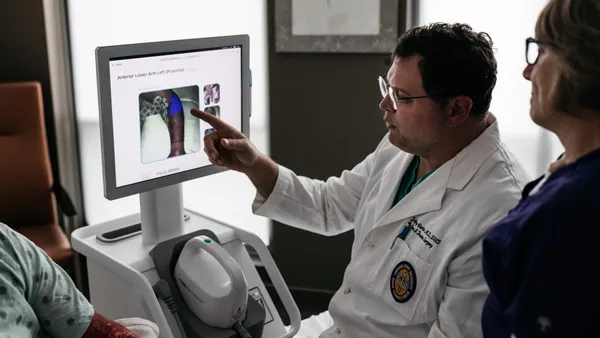Dive Brief:
- Abbott said Thursday it received Europe’s CE mark sooner than anticipated for its Volt pulsed field ablation system to treat atrial fibrillation. The company has started commercial PFA cases in the European Union.
- The device maker is working to catch up with Boston Scientific, Medtronic and Johnson & Johnson, which have a head start launching PFA devices in an electrophysiology market that is quickly shifting to the new cardiac ablation technique for restoring a normal heartbeat in people with heart rhythm disorders.
- Abbott said its Volt system is designed to improve upon what it sees as the limitations of first-generation PFA devices.
Dive Insight:
Abbott has trailed medtech competitors in bringing a PFA device to market, but now plans to accelerate its European rollout in the second half of this year, after beginning with EU physicians familiar with the system from the company’s clinical trials.
Boston Scientific reported surging electrophysiology sales in 2024, fueled by the success of its Farapulse PFA device, and Medtronic projected strong growth in its cardiac ablation solutions business. J&J, meanwhile, suffered a setback when it paused the rollout of its Varipulse PFA device due to reports of neurovascular events. J&J has since resumed cases after determining the devices worked as intended.
Abbott’s share of the electrophysiology market has dipped as its rivals introduced their PFA systems over the past year, said Citi Research analyst Joanne Wuensch. But the company should be able to shore up its market share with the Volt launch, Wuensch said in a Thursday note to clients.
Abbott finished enrolling patients in a U.S. Volt study four months early, and the company expects to complete 12 months of follow-up later this year. Abbott has said it anticipates Food and Drug Administration approval for Volt in 2026.
PFA delivers electrical pulses to destroy the cells that cause AFib, offering a potentially safer treatment with less risk of injury to surrounding tissue than older ablation methods that apply heat or cold to correct the heart’s faulty signals.
Among PFA systems, Abbott claims Volt provides clearer visualization of contact between the catheter and targeted tissue due to a single-catheter approach and can minimize the number of therapy applications needed, improving patient outcomes.
The company said it received CE mark approval based on strong clinical trial results showing Volt achieved pulmonary vein isolation, the method of destroying the tissue causing AFib, in 99.1% of patients’ veins.
In addition to its U.S. Volt trial, Abbott is studying PFA technology designed to provide focused energy delivery to create targeted lesions at specific points in the heart.












